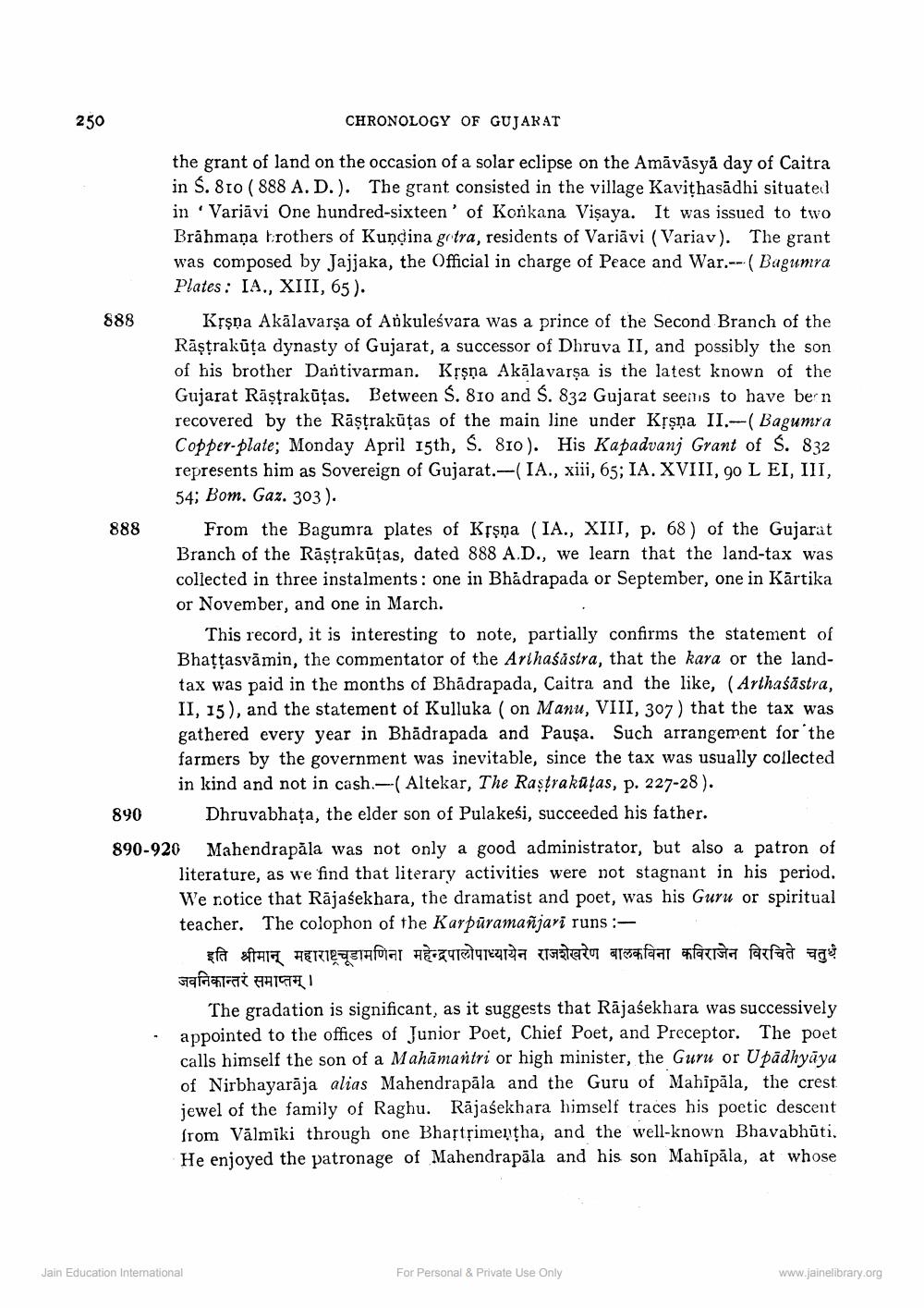________________
250
888
888
890
CHRONOLOGY OF GUJARAT
the grant of land on the occasion of a solar eclipse on the Amavasya day of Caitra in S. 810 (888 A. D.). The grant consisted in the village Kavithasādhi situated in Variavi One hundred-sixteen' of Konkana Viṣaya. It was issued to two Brāhmaṇa brothers of Kundina getra, residents of Variavi (Variav). The grant was composed by Jajjaka, the Official in charge of Peace and War.- (Bagumra Plates: IA., XIII, 65).
Krsna Akālavarsa of Ankulesvara was a prince of the Second Branch of the Răstrakūta dynasty of Gujarat, a successor of Dhruva II, and possibly the son of his brother Dantivarman. Krsna Akālavarsa is the latest known of the Gujarat Răştrakūtas. Between S. 810 and S. 832 Gujarat seems to have ben recovered by the Rāṣṭrakūtas of the main line under Krsna II.-(Bagumra Copper-plate; Monday April 15th, S. 810). His Kapadvanj Grant of S. 832 represents him as Sovereign of Gujarat.-(IA., xiii, 65; IA. XVIII, 90 L EI, III, 54; Bom. Gaz. 303).
From the Bagumra plates of Krsna (IA., XIII, p. 68) of the Gujarat Branch of the Rāṣṭrakūtas, dated 888 A.D., we learn that the land-tax was collected in three instalments: one in Bhadrapada or September, one in Kartika or November, and one in March.
This record, it is interesting to note, partially confirms the statement of Bhaṭṭasvamin, the commentator of the Arihasastra, that the kara or the landtax was paid in the months of Bhadrapada, Caitra and the like, (Arthasästra, II, 15), and the statement of Kulluka (on Manu, VIII, 307) that the tax was gathered every year in Bhadrapada and Pausa. Such arrangement for the farmers by the government was inevitable, since the tax was usually collected in kind and not in cash-(Altekar, The Rastrakāļas, p. 227-28).
Dhruvabhata, the elder son of Pulakesi, succeeded his father.
Mahendrapala was not only a good administrator, but also a patron of literature, as we find that literary activities were not stagnant in his period. We notice that Rajasekhara, the dramatist and poet, was his Guru or spiritual teacher. The colophon of the Karpuramañjarī runs:
890-920
इति श्रीमान् महाराष्ट्रचूडामणिना महेन्द्रपालोपाध्यायेन राजशेखरेण बालकविना कविराजेन विरचिते चतुर्थ जवनिकान्तरं समाप्तम् ।
The gradation is significant, as it suggests that Rajasekhara was successively appointed to the offices of Junior Poet, Chief Poet, and Preceptor. The poet calls himself the son of a Mahamantri or high minister, the Guru or Upadhyaya of Nirbhayaraja alias Mahendrapala and the Guru of Mahipala, the crest jewel of the family of Raghu. Rajasekhara himself traces his poetic descent from Välmiki through one Bhartrimeytha, and the well-known Bhavabhuti. He enjoyed the patronage of Mahendrapäla and his son Mahipala, at whose
Jain Education International
For Personal & Private Use Only
www.jainelibrary.org




